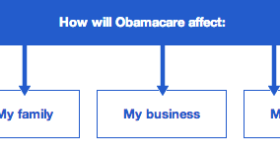Second Opinion is a weekly Q-and-A series that answers questions from San Diegans on the Affordable Care Act. Ask yours here.
The Question: What happens if people with variable incomes sign up for subsidized health coverage, but find out later they made too much to qualify for the subsidies?
Shelley is an artist and works from home. Because she's self-employed, she never really knows exactly how much money she'll make by the end of the year. Adding to the uncertainty is her new rental property.
It's boosted her income, putting her somewhere near the drop-off point for the new health care subsidies - $44,680. Whether she tips over that cliff depends on how her art business does and whether she puts a new roof on her income property, which she can write off.
Shelley wants to know what people with variable incomes should expect if they get a subsidized health plan on the state's exchange, Covered California, only to find out later they made too much to qualify.
Here's her question.
"Does the IRS base your qualification for subsidized premiums on last year's income so everyone knows whether you qualified or not, or is it maybe a rude surprise at the end of this year when you find out you didn't qualify when you though you did?"
The Takeaway: What you overpay or underpay will be reconciled at tax time.
The exchange is basing eligibility for financial assistance on prospective income during the first year because it didn't want to shut out people who haven't filed taxes before.
The big check on what people claim they make will happen when they file taxes in 2015. So if you're fuzzy on how to answer questions about household size and income when applying for coverage, think about what you tell the Internal Revenue Service each year.
The income the exchange cares about is the adjusted gross income on your tax return – any taxable income, minus deductions like Shelley's roof.
Let's say you over- or underestimate that income. What you overpay or underpay will be reconciled when you file taxes in 2015, said Covered California spokesman Santiago Lucero.
If you make more than you told the exchange, you'll have to pay the government back for all or a portion of the subsidies you claimed, depending on whether you become ineligible for financial assistance altogether or qualified for a smaller tax break.
The government will take what you owe out of your tax return, or you'll have to cut a check.
If you ended up making less and qualifying for more help, the government will cut you a check.
The Orders: Start setting aside some money if it looks like you'll go over the subsidy cliff.
If Shelley takes out a silver Covered California plan with subsidies, and her income makes the jump from $44,680 to $46,000 next, she could owe the government $4,380. That's the difference between 12 months of subsidized health coverage ($262 a month) and unsubsidized coverage ($627 a month).
Check out last week's Second Opinion: What If I Get Sick Before My Obamacare Coverage Starts?









